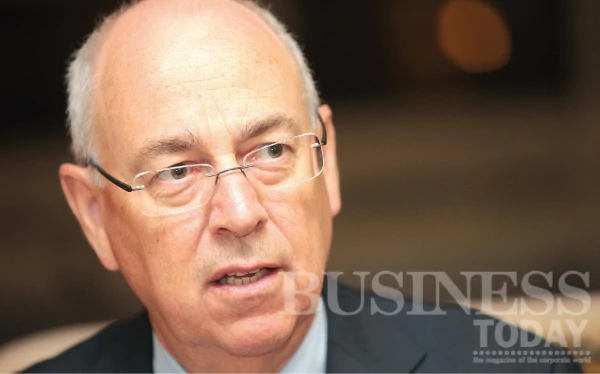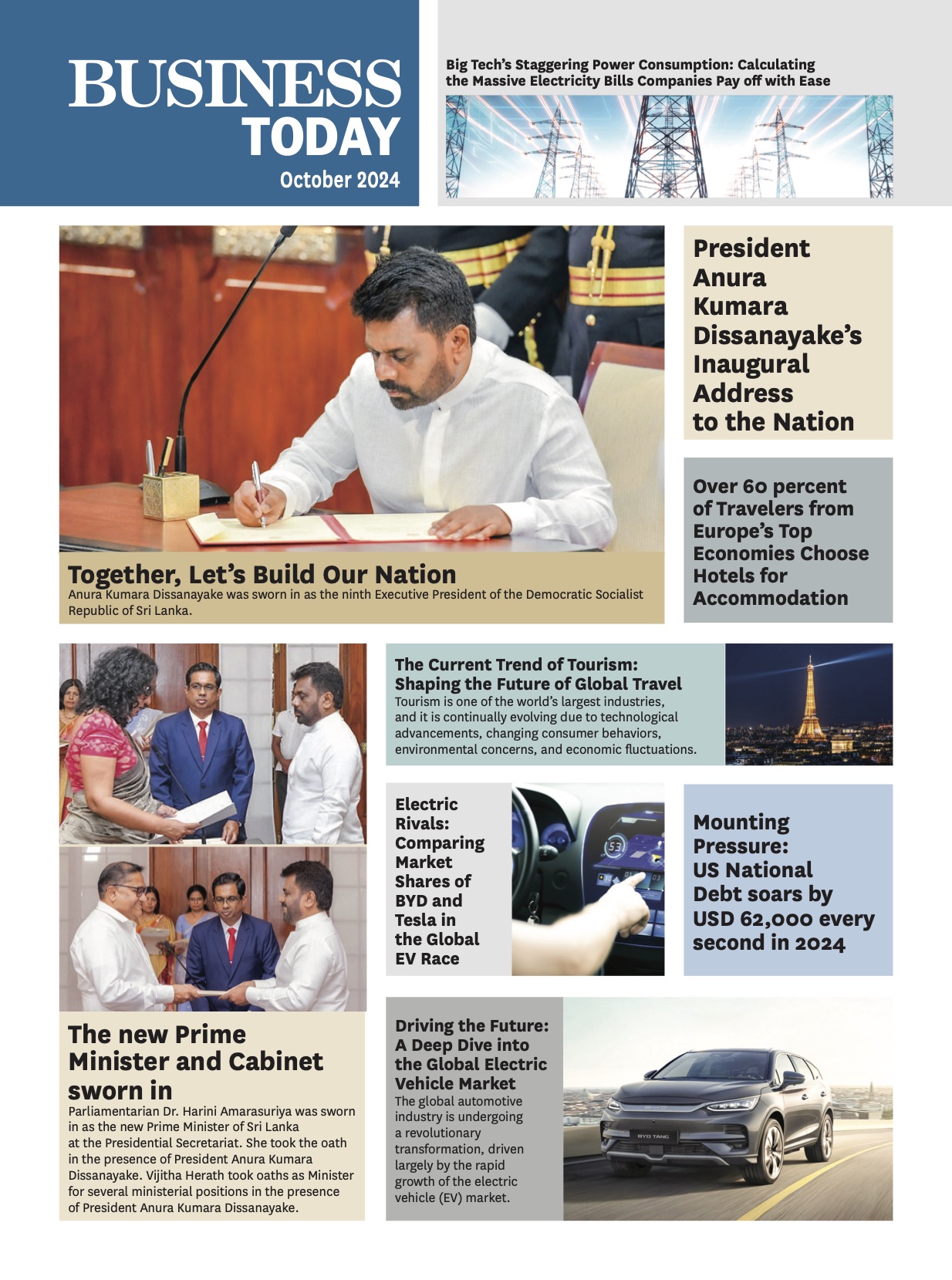
Warren Allen, President of the International Federation of Accountants (IFAC) relays his thoughts on the accounting profession and its many aspects while detailing the immense contribution provided by the profession towards the economic growth of a country.
Words Krishani Peiris
Photographs Menaka Aravinda
What is the role of the IFAC?
I believe that the accounting profession is probably the only profession that is truly global as it is more integrated globally than any other profession. And the International Federation of Accountants (IFAC) is the global organisation for the profession and supports the development, adoption, and implementation of a common set of standards in accounting, auditing, education and ethics throughout the world. As such we facilitate and work together with our member bodies to implement global standards. This is the key role of IFAC. Another role is that we uniquely position ourselves to participate in relevant debates in order to bring a global perspective to those debates and issues.
IFAC is an important body and we are a membership organisation. We are spread throughout 130 countries and jurisdictions and we have 179 member bodies. In order to obtain the membership of IFAC, we have a formal system called a Statement of Membership Obligations (SMO). And for an accountancy organisation from a country to belong to IFAC, it needs to meet these Statements of Member Obligations. SMOs set the minimum benchmark to which organisations have to comply in order to gain membership of IFAC. These SMOs are recognised by the donor community, World Bank and the Asian Development Bank as being the benchmark, which professional accountancy organisations should adhere to. Furthermore, once they reach that benchmark they need to maintain it on an annual basis. Most of the SMOs’ deal with implementation of international standards and unfortunately we have to expel members that do not maintain that level of responsibility.
The international standards detailed under the SMOs are on accounting, auditing, ethics and education. Whether an accountant is educated or qualified in Colombo, in Christchurch, in London or in New York-each has a similar basis of education. Therefore, accountants can move to any place around the globe to practice their profession.
In India, Here In Sri Lanka, Singapore And Malaysia, Especially, There Are Very Strong Professional Bodies And They Play An Important Role In The Business Community And The Economic Development Of The Country.
You have been travelling around Asia and the world. Can you talk about your experience in the countries that you have visited and how accountancy differs from one country to another?
In my role as the President of IFAC, I have travelled all over the world, but for the past two to three months I have done much work in Asia. I’ve been in Seoul-Korea, Beijing-China, Kuala Lumpur, and now in Colombo. In the meantime I have also been to America, Latin America and many other parts of the world. Much of my work includes making presentations, conferences, seminars and attending our member bodies’ meetings and making presentations and representational work to the member bodies.
Every country in Asia is different and in many countries, the accountancy profession is very strong. In India, here in Sri Lanka, Singapore and Malaysia, especially, there are very strong professional bodies and they play an important role in the business community and the economic development of the country.
If you look at China, there is a massive economic developmentcurrently underway and the accounting profession is a recently emergent field where they need 500,000 more accountants. As such, there is a huge demand in China where the accounting profession is growing dramatically with very strong support from the government. In Singapore, the government there is committed to the country being a global accountancy hub. They want the accounting profession to play a much stronger role in all parts of society.
I recently had the opportunity to talk to the Auditor General from the Maldives and there they don’t have an accounting profession and we are working with the World Bank and the Asian Development Bank to build the accounting profession in the country. Furthermore, I recently met a gentleman from the treasury of Bhutan and they also don’t have accountancy as a profession in their country, and we are starting a framework to build a strong accountancy profession there as well. Therefore, building the accountancy profession in those countries that don’t have the profession is also part of the IFAC agenda. It’s interesting to note that you will not realise the full potential of the economic growth-especially in a country-without a strong accounting profession as accountability and transparency are extremely important. That’s what the accounting profession delivers.
What is your objective of visiting each country?
My visits are about supporting the accounting profession in various countries and mostly it is about talking to regulators, accountancy firms and people that accountants interface with such as auditor generals, securities regulators, and banking regulators. During these visits the most important message that is shared is that we have much work to do in terms of improving the government transparency and accountability and of improving corporate reporting. The application and handling of corporate reports, as of now is much more than just financial information. Stakeholders want more non-financial information to understand the sustainability of an organisation. Even though an organisation might be profitable now, in the long term it may not be sustainable if it is not fully using its resources wisely while developing and maintaining its staff appropriately. As such there are many issues, which the accounting profession can have an impact on. Therefore, the visits are about communicating and introducing these matters, working with regulators and ensuring that we play our role in the global business environment.
What direction is the accounting profession heading in this changing business environment?
A key direction and one of IFAC’s initiatives that we are currently working on is increasing the awareness and action by governments around the world in terms of accountability and transparency. Many of the countries that had issues during the sovereign debt crisis were caused by a complete lack of best practices of modern systems in financial management. Many governments don’t use accrual accounting which all companies use. And as such these governments do not have an accurate record as to what their liabilities are and some of the countries in Europe that got into trouble during the latest crisis did not have proper systems of accounting. One of the key areas of change that we, the global accounting profession, is driving towards, is ensuring that all governments adopt proper systems of accounting so when economic crises turn up; they have the information to drive appropriate decisions.
Chartered Accountants, Who Qualify In Sri Lanka, Work In More Than 30 Countries. Therefore, It Is Something That Sri Lanka Should Be Very Proud Of. I Would Say That One Of Sri Lanka’s Greatest Exports Is Its Charted Accountants.
What are your thoughts on the accountancy profession in Sri Lanka and what aspects should be improved?
It is ten years since I last visited Sri Lanka and the advancement and the improvement that I’ve noticed is outstanding and If you look at the country, the economic success that it has achieved over the last 10 years is in no small part due to the strong accounting profession present.
CA (Chartered Accountants) in Sri Lanka is a very good organisation and they have a very good education programme that supports the strong education system that the country already has. The primary and secondary schools in Sri Lanka produce very good students and many go into the accounting profession and then get trained by CA Sri Lanka. An interesting fact to note is the Chartered Accountants, who qualify in Sri Lanka, work in more than 30 countries around the world. And they are very much in demand and it’s a world-recognised qualification. Therefore, it is something that Sri Lanka should be very proud of. I would say that one of Sri Lanka’s greatest exports is its chartered accountants. In my office in Wellington, New Zealand I had the pleasure of training several Sri Lankan chartered accountants and they are great assets to the country.
However, Sri Lanka like most other countries in the world needs more accountants. In the business world, the public is demanding more and more from the accountancy profession. To narrow this gap, the country and relevant organisations have to think innovatively as to how they can train and educate in qualifying more chartered accountants. This is one of the challenges that Sri Lanka faces. Also it’s very important that the President of CA Sri Lanka focuses on fostering key or critical partnerships that accountants need to set up. One such critical partnership is with the universities where they need to work with the universities, especially in training accountants. Another is with the banking regulator, the Central Bank. The CA Sri Lanka has an excellent relationship with the Governor of the Central Bank and it is interesting to know that the current governor is an accountant. This is an excellent situation as the current governor is very familiar with the accounting profession and he is a past President of CA Sri Lanka. Therefore those key relationships and partnerships are extremely important. And the chartered accountants in Sri Lanka are doing a great job in working to foster and improve those continuously.
Sri Lanka recently adopted IFRS accounting standards. Can you elaborate on the importance of this aspect?
Three of the local banks in Sri Lanka in 2013, for the first time went out to the international market to borrow money. And the international lenders said that they were surprised and impressed at the high level of compliance the Sri Lankan banks had with IFRS (international financial reporting standards) and also with international audit standards. This is a definite example of the necessity of corporates within a country to follow international standards, especially when they go on to the global market and I understand these banks went to New York, Singapore and Hong Kong.
The positive contribution towards the economy through these standards is huge. People would not lend money to an entire country or region unless they can rely on the financial information, obtain reliable reports and see that there has been a system of order. The World Bank, the Asian Development Bank and other banking institutions are very strict in this regard today.
It is important to note that one of the outcomes of the global sovereign debt crisis is that lenders no longer agree to subscribe to the notion of “risk-free” or of there being zero risk in lending to governments. They demand a level of information similar to that of the corporate world to ensure that the governments are reliable, stable and that best practices are followed.
All around the world we have witnessed many multinational companies failing due to the mismanagement of funds and poor decision making. What are your thoughts on this regard and what are the roles of an accountant and auditor in such a scenario?
It has been an unfortunate fact that over many years now, some major multinationals failed, but they did not necessarily fail due to a failure in auditing. Auditors are not responsible for the strategies or investment policies of these corporations. All an auditor can do is to ensure that the financial statements reflect the business undertakings and they cannot interfere or comment on flawed strategies in terms of the business environment of the organisation. However, there has been much criticism regarding the past audit process and we have seen some changes now, particularly in Europe due to these reviews. And I believe that whenever there is a failure there’s always a time to look at and say-can we do these things better?
We are seeing some continuous improvement in the audit process, but one of the challenges is that the expectations of the public and the investors of that audit process is somewhat or sometimes very different to what is actually been undertaken by the auditors. There needs to be a very clear understanding of what is the role, job and responsibilities of an auditor. Furthermore there is also this gap of understanding on what the public thinks that the auditor should do and what an auditor is responsible to accomplish.
People Would Not Lend Money To An Entire Country Or Region Unless They Can Rely On The Financial Information, Obtain Reliable Reports And See That There Has Been A System Of Order.
There have been many inquiries regarding auditors in relation to the latest crisis. And it was found that many have been doing their job properly, but on the other hand there are many people saying that we need to correct the way that audits are done.
When it comes to accountants, they are quite often involved in the preparation of this information (strategies and financial information) and they are responsible for valuing assets and liabilities. But at the end of the day, the senior management and the directors of an organisation have the ultimate responsibility. Therefore, even though the accountants are involved in terms of work, they cannot necessarily overrule, criticize or change the investing philosophies or strategies of an organisation.
Another fact that we have been saying often in our presentations is that more CFOs (Chief Financial Officers) should be accountants, because by being a member in the accounting profession one understands the international standards and are bound by the relevant ethical framework of a professional accounting body. If one does not comply with that ethical framework, then that person will be subjected to disciplinary action. As such, we believe that if more CFOs were members of the accounting profession, it would be much better for businesses.
Can you elaborate on your visit to Sri Lanka?
I came down to Sri Lanka for several reasons. I came to participate in the South Asian Federations of Accountants meeting, for the ceremonial induction of the new president of CA Sri Lanka and also to take part in a workshop conducted by IFAC on the development of professional accountancy organisations. I also had the opportunity to meet with some students and academics of accounting during my visit.
I’ve always enjoyed working with students and young people who are very motivated and the students that I met in Sri Lanka are very committed to the profession. The academics had a really strong interest in training and developing young people into the profession and they had some very interesting questions. Furthermore, the young generation is very understanding of sustainability and its importance to organisations. Nowadays it is not just about driving for the best profit but also about contributing to the community, staff development and utilisation of natural resources and protecting the environment. As such the young people have a brilliant understanding of the importance of all these aspects where as my generation has been negligent. I believe that young people think very much of their future and what sort of environment they leave behind for future generations.
Can you talk about what inspired you to choose accountancy as a profession and your journey so far?
When I was a schoolboy, growing up in New Zealand, my best friend’s father was a chartered accountant and I always admired his father who was a very influential figure. As such, from a very early age I had the objective of joining the accounting profession.
I started studying accountancy in secondary school and then went to university, after which I joined Ernst & Young. I’ve just completed 42 years with Ernst & Young and retired in 2012 as a partner. It’s been a fabulous profession.
An Accountancy Degree Needs A High Level Of Perseverance… Persevere And The Benefits, Once You Get Through, Along With Career Options And The Ability To Work With And Change Many People, Are Tremendous.
When I started as an accounting professional, no one had heard of personal computers let alone tablets or smart phones. Therefore, in the 40 years of my career we’ve seen the introduction of personal computers, tablets, smart phones and that whole technology progression has been remarkable and one of the things that I’ve really enjoyed is moving with that.
Another fact that I really enjoy is training young people and encouraging and developing in them a real passion for the profession. And over my professional career one of the most exciting things is to introduce the young people coming from universities to the profession and seeing them develop remarkable careers. Some of the people that I’ve worked with after their initial training have gone on to do some spectacular jobs all over the world. It’s great to reflect that I might have played a small part in their development and growth in the profession.
In conclusion.
Accounting is a great profession that is highly remunerated and has a high level of retention. In the last crisis many people in the banking, IT and marketing industries unfortunately lost their jobs. And those areas were very fashionable to study and to turn to during boom times. But accountants while the work changed, they did not lose their jobs. As such we need to encourage more people to get involved in the profession. The accounting profession itself is exciting, there’s much variety and it’s a great base for any other profession one wants to pursue. That is mainly because, through an accounting based education, one can understand ethics, business processes and the importance of financial information and taxation, which sets one up for a great career in business.
In terms of following an accountancy degree, I believe one needs a high level of perseverance as it is not something you can achieve in a year. But I will say persevere and the benefits, once you get through, along with career options and the ability to work with and change many people, are tremendous and that’s worth the perseverance.








